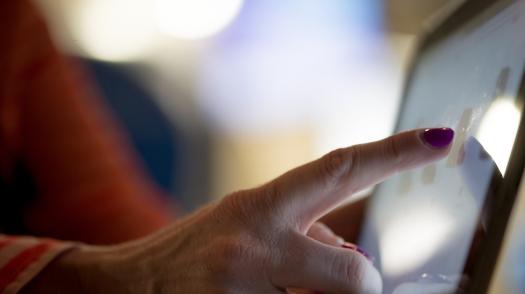
Physical effects of acquired brain injury
This page looks at the broad range of physical effects of acquired brain injury.
Trouble playing his guitar was one thing that led Alex to seek help for what turned out to be a brain tumour. He shares his story.
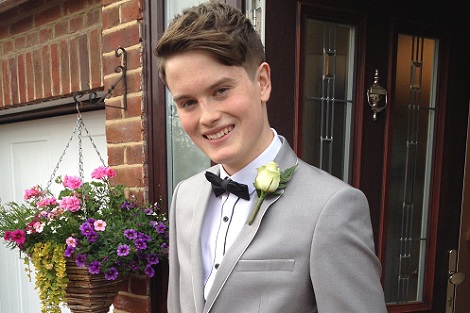
Published: May 2018. Written: 2016 (approximately). Date of brain injury: 2013, aged 15
I first started to notice that things were going wrong with everyday activities, for example, my right hand side was starting to have a slight tremor. As a result I couldn’t write and as I am a guitarist, I couldn’t hold a guitar pick or strum the strings.
Basic things that I’ve always been able to do were being made difficult by something that I didn’t understand.
I started to take these problems seriously when I was in a chemistry exam and although I knew the answers to the paper I wasn’t able to write them down.
I had an MRI scan and found out the next day, when I was on my way to Belgium with family for a family holiday, that they had found a mass on my brain. It turned out I had a brain tumour that they couldn’t operate on.
My radiologist thought I would be a good candidate for proton beam therapy and so I flew out to the USA for proton beam therapy to try and stop the tumour in its tracks.
The treatment took three months and I was very unwell and struggled with side effects. I was especially tired and slept a lot.
We returned home after three months but I started getting really bad headaches and nausea.
I was admitted to hospital and they found that the proton beam therapy had caused the tumour to swell and block the tubes that drained fluid from around the brain.
I had to have emergency surgery to drain a large build-up of fluid on my brain. I remember waking up from the surgery and for the first time in weeks not having a headache.
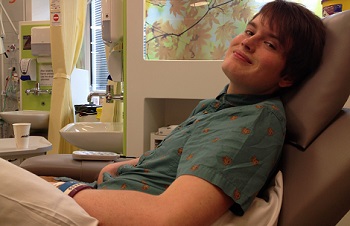
I then went to a centre for intensive rehabilitation where I stayed for three months and I started playing my guitar and the piano again.
As time goes by I am getting my life back and becoming a better me. I think my diagnosis has made me a better person. I’m more understanding, resilient and caring than I ever was before.
For a while I lost complete control of the right side of my body, I couldn’t play guitar and piano, which I love to do, so it has definitely given me more determination than ever to live my life to the full.
It has made me appreciate life and all the loved ones I hold dear. It woke me up to the fact that we only live once!
I feel that my memory was greatly affected by the tumour and still is. It can make life quite difficult at times. I keep a diary to remember all the things I need to do but often I forget I have a diary.
I find posting notes on the fridge helps and also getting friends and family to prompt me to remember things.
Naps are my best friend! Taking naps really helps me to manage my fatigue.
Fatigue is a very personal thing and you have to learn to notice when you are getting tired and take time out and rest, have a coffee and just sit down.
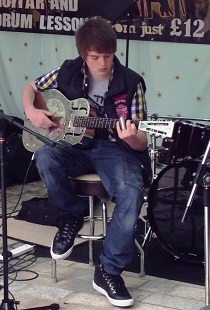
When it first happened it did knock my confidence, but over time you learn to become confident in yourself again.
Everyone is different and is affected differently. For me, it was important to keep saying yes to things like going out with friends and keeping myself busy.
Giving speeches about my story has really helped my self-confidence. Even though you are not the same as who you once were after a brain injury, you can be an even better you.
After school I plan to study geology at university. My cognitive issues and memory problems impacted hugely on my school work. Often I can’t remember having covered a topic in a previous lesson and I find I have to go over the same work multiple times to remember it.
To other teenagers with a brain injury, I would say, it’s really important to talk to teachers about the problems you face and if they can’t help you go to the SENCO.
I find it helps if teachers make me lists of things I need to do and I also have a couple of teaching assistants who will help go over topics I may have forgotten.
I have been with my girlfriend for a couple of years and I am really thankful that she understands me and the challenges I face. When I get tired, I can get quite frustrated and scared and she will see this and take me to one side and tell me it’s ok. She is really understanding.
I passed my driving test six months ago. I spoke to my doctor before I started driving and they were happy about me learning to drive.
Driving can be quite tiring but it has also been great for my freedom. I can now just pop to the shops if I want and it makes getting to school much easier as my mobility problems make walking quite difficult. It also allows me to have longer lie-ins which really helps with fatigue.
I used to drink before my brain injury and I don’t feel it has really changed the way alcohol affects me.
However, everyone is an individual. My advice to others is if you are going to drink, take it easy, don’t drink too much and drink plenty of water to stay hydrated.
I have a weekend job, cooking food at a friend’s football club. It has a really good atmosphere and I enjoy it.
Having a job and earning money really helps build your confidence and teaches life skills and skills for the future, such as communicating with people.
Alex's story is printed in Me and my Brain, a handbook for teenagers affected by acquired brain injury, which can be ordered here.

This page looks at the broad range of physical effects of acquired brain injury.

Our 'cognitive functions' describe the complex things that go on inside our head.
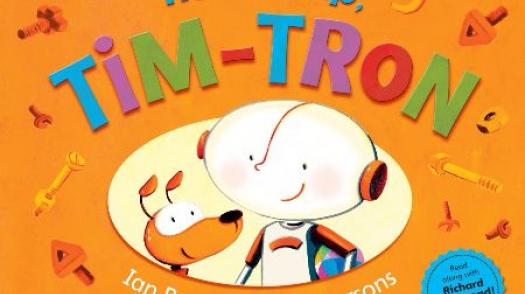
Our series of free books and resources aimed at children and families (P&P costs only).